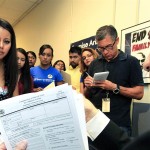Citing state officials, Reuters is reporting that California issued “about 131,000 driver’s licenses to undocumented immigrants in January and February, the first two months since the state began granting the permits to people who are in the country illegally.”
The news services added that “the most populous U.S. state joined nine others and the District of Columbia in granting licenses to drivers regardless of immigration status, a controversial move that marked a significant shift in policy toward immigrants in California.” The lack of a driver’s license has long been a problem in the Golden State, prompting some cities to issue their own forms of ID.
Between 2 million and 3 million unauthorized immigrants are believed to live in California, making them the nation’s largest such population. Immigration courts, meanwhile, face a backup of some 400,000 cases. Such cases are civil, not criminal, proceedings. To read more about the driving issue, click here.


